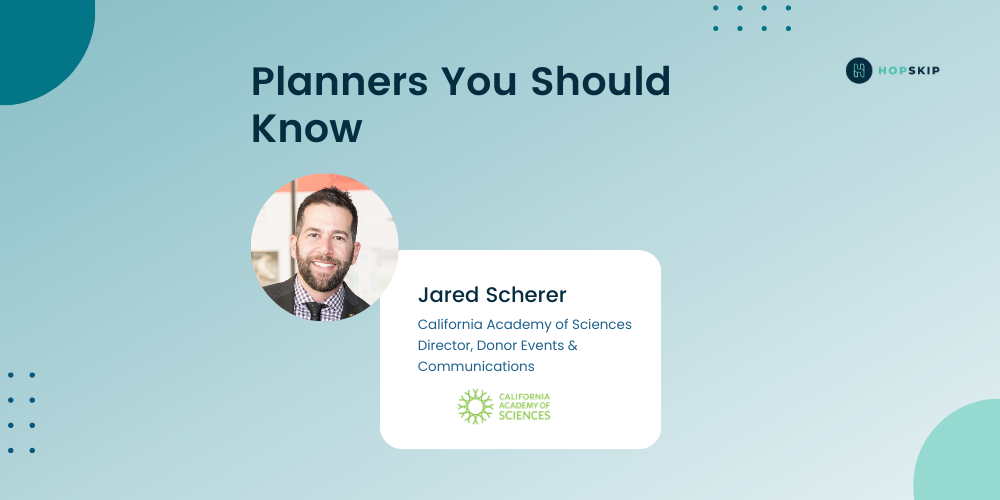This post is part of the HopSkip Planner Spotlight Series where HopSkip spotlights planners across the industry to bring awareness of how they adapted to COVID-19, communicating and lessons learned and sharing how they are viewing the meetings and events industry in a post-pandemic world.
Name: Jared Scherer
Company Name: California Academy of Sciences
Job Title: Director, Donor Events & Communications
Years of Experience: 15+
How did you get your start in the events industry? What made you pursue this role?
My background is in higher education, and my first couple of jobs were working at two Bay Area universities. I ran the new student orientation program at Stanford--200 events in 2 weeks (no joke!) and got hooked!
How do you compare planning your first in-person event post-pandemic, to planning meetings/events pre- Covid? What was different and unique? What was similar?
This was a tremendous opportunity to rethink everything from the ground up, and we did just that. We certainly learned so much during the pandemic--and took a hard look at what we should trim, keep, or change. We learned that people were very eager to connect with each other once again--there's truly nothing that can replace this part of an event--but to do so in a new and safe way. We also learned the value and impact of virtual and now hybrid events (along with the logistical challenges that it presents).
What was your number one challenge in hosting your first in-person event(s) and how did you overcome it?
The number one challenge was compliance with the new way of doing things--when people came to our first large-scale, in-person event, there were new health & safety requirements. We required guests to show proof of vaccination, to wear masks unless eating or drinking, and to limit consumption of food to certain locations. Asking guests to move around our space in this new way was tricky--for them and for us due to the new normal-ness of it all.
What is the top learning that you uncovered from the last two years that you’re implementing in your planning process today? (any other tips or tricks you want to share?)
Planning events in this new post-Covid normal takes more thoughtfulness and time. Everything needs to be tweaked and retooled, so my advice is to build extra time in your planning process--and stick to it!
With hotels short-staffed, and RFP lead time shortening, what is your advice to other planners to overcome these obstacles when requesting hotels for proposals?
My advice is to be nimble and compassionate in this time of flux and uncertainty. If anything, we've learned that business as usual is no longer the norm.
Are you approaching contracting with hotels differently, post-pandemic?
We don't typically host events off-site, outside of our museum, but with the venues that we work with, we've decided to narrow down the properties that we've worked with well before and not ask for multiple RFPs from different venues, which feels a bit more reasonable to us and to the sites we work with.
What is the biggest area of improvement that you think hotels can make when either responding to your RFPs or during the contract phase of your event?
I love to collaborate. Venue partners that work with us to envision an event usually get our business. Meeting with us, asking many questions, asking what our goals are--those things matter and show that our partners care about the success of our events and want to support us in an authentic way. When it's all about finances, capacities, and the bottom line, while important, feels sterile and impersonal.
Due to the pandemic, our events community had to evolve, adapt, and grow. Many planners started to embrace new technologies as a result of the pandemic. What new tech are you using today in your planning process as a result?
We've mainly relied on virtual meetings as part of our planning process and have had several virtual and live-streamed events. This has proven successful for our organization. As we've started to come out of the pandemic, we've been transitioning back to in-person events, but still host some hybrid events as well, to varying degrees of success.
Since education and relationships are two major pillars in the meetings and events industry, any suggestions on how other planners can learn and network with their peers across the industry?
I've found that conferences are the best way to find and connect with colleagues from all different industries, professions, and backgrounds. During the pandemic, a few of my colleagues and I formed a virtual planners group for local professional planners that has since grown quite a bit in size, and has been a phenomenal resource for problem-solving, brainstorming, and resource sharing.
This post is part of the HopSkip Planner Spotlight Series where HopSkip spotlights planners across the industry to bring awareness of how they adapted to COVID-19, communicating and lessons learned and sharing how they are viewing the meetings and events industry in a post-pandemic world.
